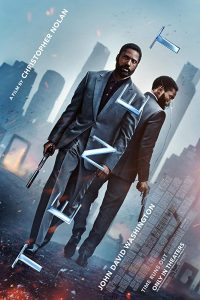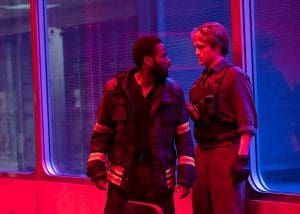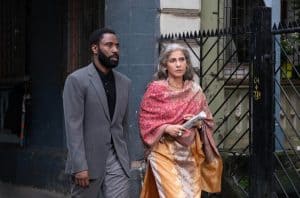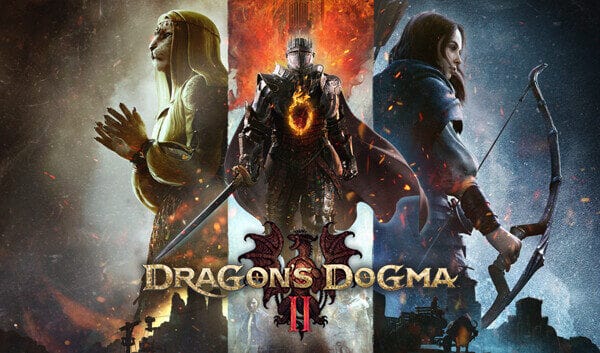Note: this reviewer saw TENET in a public theatrical screening, albeit a sparsely attended one. If you are planning on attending a traditional cinema rather than a drive-in, please consult the current guidelines and health risks espoused by pandemic experts.
Disclaimer: there are NO MAJOR SPOILERS in this review, but you may be able to infer MAJOR SPOILERS since there ain’t all that much to guess. Nevertheless, proceed with caution. Also, this is pretty long, apologies for that.
 In the decade following Inception, it’s been a deeply frustrating time to be a Christopher Nolan fan. Not that the man was infallible prior to that still-exhilarating modern classic, but his works since then have been all over the place, even arguably leaning more towards outright duds than home-run swings. But what’s most frustrating about the slump he’s fallen into over the last 10 years is that he has been deliberately leaning into all of his weakest aspects as a writer-director for no discernible reason. Or, to put it more bluntly, I get the impression that, despite being given an unquestioned auteur license to make whatever he wants and backed up by the adoration of a vocal fanbase/cult whose members make up 95% of every freshman Film Studies class (speaking from experience), Christopher Nolan is maybe the most insecure and thin-skinned Hollywood director working today?
In the decade following Inception, it’s been a deeply frustrating time to be a Christopher Nolan fan. Not that the man was infallible prior to that still-exhilarating modern classic, but his works since then have been all over the place, even arguably leaning more towards outright duds than home-run swings. But what’s most frustrating about the slump he’s fallen into over the last 10 years is that he has been deliberately leaning into all of his weakest aspects as a writer-director for no discernible reason. Or, to put it more bluntly, I get the impression that, despite being given an unquestioned auteur license to make whatever he wants and backed up by the adoration of a vocal fanbase/cult whose members make up 95% of every freshman Film Studies class (speaking from experience), Christopher Nolan is maybe the most insecure and thin-skinned Hollywood director working today?
By that loaded-as-hell accusation, I mean that every one of Nolan’s films post-Inception feels calibrated in an effort to show his critics what for, even though a lot of the things he’s attempting to respond to in his work are less critiques and more general observational analysis? Like, cards on the table, Christopher Nolan is a very good filmmaker but he is also a limited filmmaker. His niche is too-clever-by-half Swiss watch blockbusters fixated on manly men (almost exclusively White) doing manly men things either because that’s Just What They Do or because a woman died/wronged them at some point. They’re full of spectacle but the action itself rarely reaches the levels of stylish pulse-pounding clarity and excellence as the sort you’d get from, say, a Chad Stahelski or golden age Kathryn Bigelow. His films do have theme and characters whose grace notes can brilliantly intertwine with the moment where his twisty non-chronological puzzles snap into place, but they are also at least partly detached, a touch cold, and rudimentary in the details, they take a backseat to the unfolding magic trick. And, to be clear, this is all perfectly fine. His wheelhouse is his wheelhouse and he’s really bloody good at his wheelhouse.
 But ever since Inception, Nolan seems to have taken those critiques and analyses as deeply personal attacks on his standing as a do-no-wrong auteur, with each new film attempting to address those issues in frequently ham-handed and unsatisfactory ways. The Dark Knight caught flack in some corners for largely rejecting the campiness and melodrama of comic books in favour of deconstructionist gritty realism, whilst also having it pointed out that his film is, subtextually, loaded with allegories and uncomfortable pro-Patriot Act messaging towards the War on Terror. So, The Dark Knight Rises attempted to intentionally meet those two critiques head on by meshing together a more comic-book-y tone and narrative with hot button references to class inequality, the rise of populism, and Occupy Wall Street; the result being a tonally confused, narratively unsatisfying and thematically incoherent mess.
But ever since Inception, Nolan seems to have taken those critiques and analyses as deeply personal attacks on his standing as a do-no-wrong auteur, with each new film attempting to address those issues in frequently ham-handed and unsatisfactory ways. The Dark Knight caught flack in some corners for largely rejecting the campiness and melodrama of comic books in favour of deconstructionist gritty realism, whilst also having it pointed out that his film is, subtextually, loaded with allegories and uncomfortable pro-Patriot Act messaging towards the War on Terror. So, The Dark Knight Rises attempted to intentionally meet those two critiques head on by meshing together a more comic-book-y tone and narrative with hot button references to class inequality, the rise of populism, and Occupy Wall Street; the result being a tonally confused, narratively unsatisfying and thematically incoherent mess.
Then, the observation that Nolan’s films are emotionally cold started gaining proper traction in critical circles. So, he goes off and makes Interstellar which tried to decipher what the midpoint between Stanley Kubrick and Steven Spielberg would be (assuming we forget A.I. exists) with the answer ending up an overwrought, overly-complicated and overambitious mess. Then his bona fides as an action director who was technically sound but lacking in intensity were called into question at the same time he was being dinged for lavishly complex narratives. So, he made the mostly stripped-back all-intensity borderline art-film Dunkirk and that actually worked out really well but you hopefully get my point. By and large, Christopher Nolan has spent much of the last decade being obsessed over the perceived image of Christopher Nolan and, for the life of me, I cannot understand why.
At the very least, even if his films have been feeling less and less essential as the decade has rolled on, these weirdly defensive projects remained interesting to watch. Unfortunately, that particular trait is nowhere to be found in his newest work. TENET functions as Nolan’s response to that Honest Trailer for “Every Christopher Nolan Movie” which made the rounds a few years back where he, for some inexplicable reason, has put together exactly the movie his critics have always accused him of making. TENET is needlessly obfuscating, drearily self-serious and in love with its own trumpeted cleverness, emotionally dead, lacking in any characters or depth, filled with the absolute clunkiest of dialogue, mixed like you’re trying to listen in on an argument between two theoretical physicists whilst stuck in the middle of a whirring jet turbine, and about absolutely nothing but its own damn self. It’s sort of the moviemaking equivalent of burning your Nikes to own the libs, or when your favourite band releases an album that intentionally paints them as everything their staunchest critics have accused them of being. Much, much, much worse than any of that, however, Christopher Nolan has made his first boring movie.
 Here would be where I, the writer, provide to you, the reader, a narrative summary of TENET and, since I went and saw this in a cinema (again maybe don’t do that) post-release, I can be as spoilery as I want and don’t have to be hemmed in by arbitrary NDAs or what have you. The problem with that, though, is TENET isn’t about anything. To be sure, TENET has plot. It has plot out of the wazoo. Characters in TENET cannot wait to vomit out reams upon reams upon reams of expository plot details of how certain characters are related, or how certain concepts work, or where they need to go next, or to mull over paradox theory. But none of it really means anything, just endlessly verbose McGuffins designed to justify the big setpieces, like a video game except without a video game’s ability to get out of the damn way and just let the mechanics do the thing. Ironically, Nolan has a scientist in the first 20 minutes state with regards to inversion, reversing an object’s entropy to make it sorta travel back through time, that “you shouldn’t try to understand it, just feel it” yet spends so much of his movie trying to make his audience understand how this concept works with so much theoretical gobbledegook, instead of just showing it, that it becomes borderline impenetrable.
Here would be where I, the writer, provide to you, the reader, a narrative summary of TENET and, since I went and saw this in a cinema (again maybe don’t do that) post-release, I can be as spoilery as I want and don’t have to be hemmed in by arbitrary NDAs or what have you. The problem with that, though, is TENET isn’t about anything. To be sure, TENET has plot. It has plot out of the wazoo. Characters in TENET cannot wait to vomit out reams upon reams upon reams of expository plot details of how certain characters are related, or how certain concepts work, or where they need to go next, or to mull over paradox theory. But none of it really means anything, just endlessly verbose McGuffins designed to justify the big setpieces, like a video game except without a video game’s ability to get out of the damn way and just let the mechanics do the thing. Ironically, Nolan has a scientist in the first 20 minutes state with regards to inversion, reversing an object’s entropy to make it sorta travel back through time, that “you shouldn’t try to understand it, just feel it” yet spends so much of his movie trying to make his audience understand how this concept works with so much theoretical gobbledegook, instead of just showing it, that it becomes borderline impenetrable.
In a sense, TENET is like Primer but with guns, except that comparison isn’t quite true either since, for all of Primer’s absolutely insufferable pretension, at least the latter film had characters to hold onto. The people who make up TENET could only hope to be so lucky. I spent 150 minutes in the presence of TENET’s cast of spooks and terrorists and I could not tell you a single defining feature about all except one of them. John David Washington’s protagonist is such a literal blank slate that he is just called The Protagonist by both subtitles and the end credit scroll – and also, at times, himself in-dialogue where he’ll say things like “I’m the protagonist of this story” whilst I snort in derision. Unsurprisingly, since nobody has any character or traits, not one member of Nolan’s typical excellently assembled cast gets to do much of anything besides exist on-screen. There’s a relatively brief scene where Robert Pattinson gets to display a flicker of his devilish charm when he and Washington are planning a dramatic break-in to a secure facility – mainly because the combination of his body language, manner of speaking, and scarf-and-suit costume made it very apparent Pattinson’s doing a riff on Nolan himself – but other than that, one of our most interesting and livewire actors is completely wasted dryly delivering metric butt-tonnes of pointless exposition.
 The one clanging exception to this rule is Elizabeth Debicki as the largely-unwilling wife of Russian bad guy Kenneth Branagh – himself an exception to the rule of actors in TENET not getting to do much by going ridiculously over-the-top hammy in a way that’s embarrassingly at odds with the reserved self-seriousness of the movie at large. See, Nolan appears to have heard the frequent criticism that he does not care about female characters in his films unless they’re fridged fuel for his male protagonists, so he’s chosen to address this issue by… making Debicki a victim of domestic abuse with a son she can’t see and won’t stop talking about. Perhaps unsurprisingly, Christopher Nolan does not handle this topic at all sensitively, still doesn’t bother to give Debicki much agency in the plot anyway, and, most egregiously, the domestic abuse has very little to do with the inversion conceit and main plot, largely existing in its own little unpleasant bubble until a last-minute exposition dump – delivered in the mist of the film’s climax underneath a raging battlefield with one character talking through a mask and another through a rinky-dink cellphone because Nolan is just trolling those calling out his atrocious sound mixing by this point. Instead, it just seems to be there as a cheap pop, a way for the audience to know at a glance who the bad guy is since it takes Branagh an hour to appear on-screen and even longer to start doing stuff himself.
The one clanging exception to this rule is Elizabeth Debicki as the largely-unwilling wife of Russian bad guy Kenneth Branagh – himself an exception to the rule of actors in TENET not getting to do much by going ridiculously over-the-top hammy in a way that’s embarrassingly at odds with the reserved self-seriousness of the movie at large. See, Nolan appears to have heard the frequent criticism that he does not care about female characters in his films unless they’re fridged fuel for his male protagonists, so he’s chosen to address this issue by… making Debicki a victim of domestic abuse with a son she can’t see and won’t stop talking about. Perhaps unsurprisingly, Christopher Nolan does not handle this topic at all sensitively, still doesn’t bother to give Debicki much agency in the plot anyway, and, most egregiously, the domestic abuse has very little to do with the inversion conceit and main plot, largely existing in its own little unpleasant bubble until a last-minute exposition dump – delivered in the mist of the film’s climax underneath a raging battlefield with one character talking through a mask and another through a rinky-dink cellphone because Nolan is just trolling those calling out his atrocious sound mixing by this point. Instead, it just seems to be there as a cheap pop, a way for the audience to know at a glance who the bad guy is since it takes Branagh an hour to appear on-screen and even longer to start doing stuff himself.
Sod it, I’ve held off long enough, it’s time to properly bring Inception into this review. In the bluntest TL;DR terms, everything that TENET is attempting to do, Inception did far better ten years ago. Ellen Page’s character in the latter film solely exists as a justification for the other characters to fling all of the required exposition on how the mechanics work, yet I can tell you more about her than any of the cast who crop up in TENET. Inception also shares the structural quirk of needing to spend over an hour meticulously explaining the various pieces of Nolan’s mousetrap before shit can really kick off, but there he at least pairs that necessity with a playfulness which is almost completely lacking from TENET’s glumly self-satisfied ultra-seriousness. In Inception, he keeps demonstrating how the mechanics work visually, actively, rather than didactically and that’s consistently engaging to witness; think of the dream Paris construction, the montage of Cobb and his wife, or the Escher stairs. By contrast, TENET withholds much of the spectacle of its conceit until well over 90 minutes in, and fills that time with a very drab utilitarian visual language provided by Nolan’s new regular cinematographer Hoyte van Hoytema, causing proceedings to drag.
 And to go back to the point which caused me to bring Inception into the fold, Nolan seems to position the domestic abuse survivor arc of Debicki’s character as the emotional core of TENET. But because it has precious little to do with the inversion spy thriller conceit and the criss-crossing narrative flow, the entire thread feels rather exploitative and its resolution lacks impact since it’s ancillary to everything else. By contrast, Inception weaves the emotional core of Cobb’s self-destructive guilt over the emotional abuse he inflicted on his wife directly into the fabric of the multi-layered dream conceit. So, when that thread achieves its payoff at the same time as the pure mechanics of the inception snap into clear focus, the effect soars on multiple levels and is inextricably intertwined together.
And to go back to the point which caused me to bring Inception into the fold, Nolan seems to position the domestic abuse survivor arc of Debicki’s character as the emotional core of TENET. But because it has precious little to do with the inversion spy thriller conceit and the criss-crossing narrative flow, the entire thread feels rather exploitative and its resolution lacks impact since it’s ancillary to everything else. By contrast, Inception weaves the emotional core of Cobb’s self-destructive guilt over the emotional abuse he inflicted on his wife directly into the fabric of the multi-layered dream conceit. So, when that thread achieves its payoff at the same time as the pure mechanics of the inception snap into clear focus, the effect soars on multiple levels and is inextricably intertwined together.
In so many words, Inception is actually about something. It has a story, it has characters with wants and desires and arcs and baggage to work through, it has a point. What is the point of TENET? What is it about? What do its characters want? What is everyone trying to accomplish beyond “bad guys want to destroy the world?” I’ve been mulling it over for the past three days, including talking to many other people who have seen the film, and I’m honestly still not sure that it has one. The entire film is emotionally and thematically hollow, there’s only the central underwhelming magic trick.
To that end, it wouldn’t be such a big deal if the actual filmmaking wasn’t such a bore. Boredom is a rather new concept for a Nolan film, but it turns out that stripping much of the visual splendour and character work from the first 90 minutes of Inception just leaves an increasingly dull series of scenes where sharp-dressed men say plot lines and McGuffin names back and forth to each other whilst waiting for Nolan to finally let us in on the fireworks factory. Weirdly, you can actually cut a good chunk of these scenes and lose precious little to the film or its rhythm, since it’d probably make the inversion concept less confusing and it’s not like you’d be losing any fun character beats either. And since there’s an almost complete lack of even the slightest playfulness to this early going – not even a hint of “I bought the airline, it seemed neater” energy – I found myself checking my watch during a Christopher Nolan movie. That’s a foreign feeling.
 Eventually, rather like this review, TENET does finally start showing instead of telling and it’s… fine? Whilst acknowledging the impressive fact that choreographing these kinds of supremely complicated reverse-takes practically and in-camera – and, eventually, some forward- and some reverse-takes ongoing at the same time – takes supreme effort and handling of craft, I found the spectacle to be weirdly reserved and only hinting at the true potential that the inversion conceit could have for big action setpieces. That’s not to say there aren’t some pretty cool stretches: the already-trailed Boeing 747 crash is spectacular in its audacity, there’s a clever mid-film highway heist that I don’t think I’ve seen before (even though the section of it I’m referring to takes place before the inversion shows up), and the bombastic finale sees Nolan embracing the kind of deliberate abstract incomprehensibility prime Michael Bay used to be a master of. But everything lacks punch (in spite of the booming sound mix) and intensity, much of the spectacle (thanks to dodgy-as-hell editing from the usually great Jennifer Lame) cuts out just as it seems to be going, and, overall, I never got the sense Nolan was having any fun with this. That he never pushes the concept as far as it could go and embraces the possibilities. The grand reveal, frankly, is not all that impressive or mindblowing.
Eventually, rather like this review, TENET does finally start showing instead of telling and it’s… fine? Whilst acknowledging the impressive fact that choreographing these kinds of supremely complicated reverse-takes practically and in-camera – and, eventually, some forward- and some reverse-takes ongoing at the same time – takes supreme effort and handling of craft, I found the spectacle to be weirdly reserved and only hinting at the true potential that the inversion conceit could have for big action setpieces. That’s not to say there aren’t some pretty cool stretches: the already-trailed Boeing 747 crash is spectacular in its audacity, there’s a clever mid-film highway heist that I don’t think I’ve seen before (even though the section of it I’m referring to takes place before the inversion shows up), and the bombastic finale sees Nolan embracing the kind of deliberate abstract incomprehensibility prime Michael Bay used to be a master of. But everything lacks punch (in spite of the booming sound mix) and intensity, much of the spectacle (thanks to dodgy-as-hell editing from the usually great Jennifer Lame) cuts out just as it seems to be going, and, overall, I never got the sense Nolan was having any fun with this. That he never pushes the concept as far as it could go and embraces the possibilities. The grand reveal, frankly, is not all that impressive or mindblowing.
Speaking of that sound mixing, since I’ve constantly alluded to it throughout but can’t figure out a place to better integrate a full tangent about it into the prose: I ended up seeing TENET at a subtitled screening and THANK FUCK FOR THAT. By the second minute, my eardrums were being blasted with concussive force by piercing gun shots, booming explosions, clipping levels everywhere, the throbbing roar of Ludwig Göransson’s actually good score which is done dirty by being inexcusably mixed louder than everything else, whilst the dialogue remained at best muffled and at worst completely incomprehensible were it not for the subtitles. I’d say it’s about the same level of loudness and quality of mixing as that featured in Dunkirk but with the crucial difference that Dunkirk was an extremely simple film largely lacking in dialogue, where understanding that which is there is not a requisite to following along, whilst TENET is a proudly complex film whose dialogue is vital to understanding not just its theoretical concepts but also where people are heading and what they’re currently attempting to do. The dialogue of Dunkirk was optional so the artistic decision to mostly drown it out was forgivable; the dialogue of TENET is mandatory so mixing the movie like you’re Dave Fridmann is inexcusable.
 Watching TENET is numbing and not in a good or intended way. There is admittedly a chance that rewatching the film in the future may cause currently unacknowledged hidden depths to illuminate themselves and I’ll retract the vast majority of this self-indulgent ramble in the face of such – it’s not impossible, I had to see Dunkirk a second time to connect with its stripped-back intensity and now I think it’s one of Nolan’s best films. And there is the personal taste caveat that I prefer my time-travel and time-travel adjacent narratives to work on Bill & Ted “it’s time travel, just go with it” logic because otherwise my broken-ass brain gets fixated in tied-up knots on trying to reconcile the mechanics and paradoxes of how it all works, resultantly missing out on the metaphorical, character and thematic substance of the film at large – this is why it took me years to love Rian Johnson’s Looper because I got hung up on the logistics of its ending.
Watching TENET is numbing and not in a good or intended way. There is admittedly a chance that rewatching the film in the future may cause currently unacknowledged hidden depths to illuminate themselves and I’ll retract the vast majority of this self-indulgent ramble in the face of such – it’s not impossible, I had to see Dunkirk a second time to connect with its stripped-back intensity and now I think it’s one of Nolan’s best films. And there is the personal taste caveat that I prefer my time-travel and time-travel adjacent narratives to work on Bill & Ted “it’s time travel, just go with it” logic because otherwise my broken-ass brain gets fixated in tied-up knots on trying to reconcile the mechanics and paradoxes of how it all works, resultantly missing out on the metaphorical, character and thematic substance of the film at large – this is why it took me years to love Rian Johnson’s Looper because I got hung up on the logistics of its ending.
But… for the first time ever, I’m not in any hurry to go back to an underwhelming Christopher Nolan movie and find out if a second go-around can fix my current issues with the film (and not just because of the ongoing plague). Despite the mini-dissertation I have spilled across this digital page, the most substantive and damning things I have to say about TENET are that it’s completely empty, Inception is superior in every single way, and that this is Nolan’s first boring film. For all the theorising as to why he would want to deliberately give his harshest critics all the ammo in the world by making a film which lives down to their view of him, for all the hypothesising that a decade of conceptualising the film may have finally seen him catastrophically overthink himself into a corner, for all the denying of a likely reality that Nolan has simply tunnelled so deep into his own arse that he’s built all-inclusive holiday resorts inside there… None of that changes the truth that I spent the runtime of TENET simply bored by the film playing in front of me.
Leaden, sputtering, incoherent, protracted, and when the smoke and mirrors of Nolan’s big magic trick finally subside there’s merely an unsatisfying line-graph where the bunny rabbit is supposed to be. It remains a frustrating decade to be a Christopher Nolan fan.
TENET is currently playing in cinemas nationwide. Before venturing to a cinema, check the current guidelines and health risks involved as espoused by pandemic experts.







